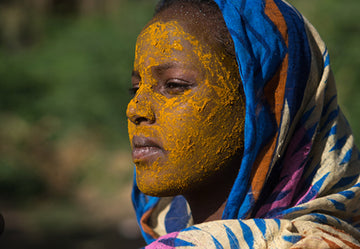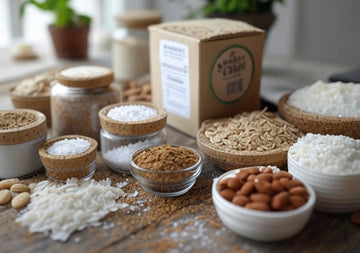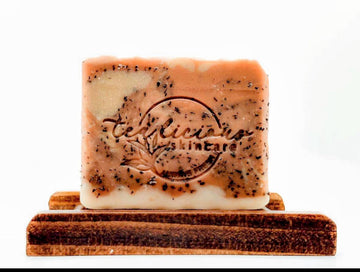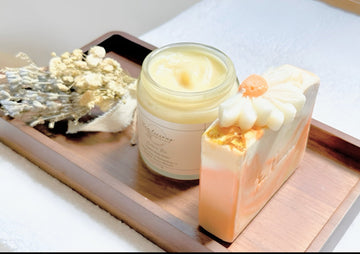For centuries, African women have turned to the continent’s rich bounty of herbs and spices to nurture their skin, creating time-honored remedies that promote wellness, health, and radiant beauty. Today, brands like Tea-Licious Skincare are bringing these ancient traditions into modern cosmetics, blending African ingredients like guava, baobab, and hibiscus with tea-based formulations to create handcrafted, eco-friendly products. This blog explores the historical use of African herbs and spices in women’s skincare, their modern applications, and how Tea-Licious Skincare honors this legacy while appealing to the wellness and health generation—millennials, Gen Z, sensitive skin sufferers, eco-conscious consumers, and wellness enthusiasts—through sustainable beauty and natural skincare advocacy.
The Legacy of African Skincare: Ancient Wisdom for Modern Beauty
African skincare traditions date back thousands of years, rooted in the continent’s diverse ecosystems and cultural practices. Women across Africa have long used herbs and spices to address skin concerns, from dryness in arid regions to irritation in humid climates. These remedies were not just about beauty—they were a holistic approach to wellness, supporting both physical health and spiritual well-being. Ingredients like guava leaves, baobab fruit, and hibiscus flowers were prized for their healing properties, passed down through generations as part of daily rituals.
In rural African communities, women would grind guava leaves into a paste to treat acne, use baobab oil to hydrate dry skin, and brew hibiscus tea to splash on their face in the baking sun. These simple ingredients left no footprint because they were used as nature presented them. Not created and spoiled by a lab. Today, Tea-Licious Skincare, founded by Lorraine Cook, draws inspiration from this heritage. With her British-African roots and a deep connection to Africa and the importance of balancing nature, Lorraine blends these ancient remedies with modern tea-based skincare, offering chemical-free beauty products that honor tradition while meeting the needs of the wellness and health generation.
Guava: The Acne-Fighting Herb of African Tradition
Guava (Psidium guajava), native to tropical regions including parts of Africa, has been a staple in African skincare for its antimicrobial and anti-inflammatory properties. Historically, women in West Africa would crush guava leaves into a paste, applying it to acne-prone areas to reduce breakouts and soothe irritation. The leaves were boiled then made into a paste to treat acne and prevent infections.
Modern research validates these ancient practices. A 2019 study in the *Journal of Cosmetic Dermatology* found that guava leaf extract reduces sebum production and fights acne-causing bacteria like Staphylococcus aureus, making it ideal for oily and acne-prone skin. Its high vitamin C content—up to four times that of an orange—also combats free radicals, as noted in a 2004 study in the *Journal of Zhejiang University Science*, helping to slow signs of aging and promote smooth skin.
Tea-Licious Skincare incorporates guava tea into their handcrafted products, such as their tea-infused cleanser, which cleanses without stripping the skin. This aligns with the needs of sensitive skin sufferers, who benefit from guava’s gentle, non-toxic properties. For the wellness and health generation, guava’s ability to support skin health while offering internal benefits—like improved lipid profiles, per a 2004 *Asia Pacific Journal of Clinical Nutrition* study—makes it a holistic addition to their skincare routine.
Baobab: The Hydrating “Tree of Life” in African Skincare
Baobab (Adansonia digitata), often called the “Tree of Life,” has been a cornerstone of African skincare, particularly in arid regions like the Sahel. African women have long extracted oil from baobab seeds to hydrate dry skin, protect against harsh sun exposure, and heal minor wounds. The fruit’s pulp was also used as a mask to nourish the skin, a practice that reflects the resourcefulness of ancient beauty rituals.
Scientific studies support baobab’s efficacy in skincare. A 2018 study in *Molecules* highlighted baobab’s high vitamin C content and omega fatty acids (3, 6, and 9), which deeply moisturize and strengthen the skin barrier. Cosmetic chemist Rachel Ho, cited in a 2022 *Byrdie* article, notes that baobab oil reduces transepidermal water loss, making it ideal for dry or sensitive skin. Its antioxidant properties also protect against environmental damage, promoting a healthy complexion.
Tea-Licious Skincare uses baobab tea extracts in their mature products, which provides intense moisture retention for a radiant glow. This appeals to wellness enthusiasts who value baobab’s internal benefits—such as collagen production, as noted in the *Molecules* study—alongside its external effects. For eco-conscious consumers, Tea-Licious’s small-batch production and plastic-free packaging ensure that this ancient remedy is delivered in an environment-friendly beauty format.
Hibiscus: The Rejuvenating Flower of African Beauty Rituals
Hibiscus (Hibiscus sabdariffa), known as “bissap” in West Africa, has been a beloved ingredient in African skincare for its rejuvenating and hydrating properties. Women would brew hibiscus tea to create toners that brightened the complexion. These rituals were often communal, reflecting the cultural importance of beauty as a shared experience.
Modern research confirms hibiscus’s benefits. A 2022 study in *PMC* found that hibiscus acid reduces oxidative stress in skin cells, protecting against wrinkles and fine lines. Its alpha-hydroxy acids (AHAs), like citric and malic acid, gently exfoliate, as noted in a 2020 *MindBodyGreen* article, making it a favorite for exfoliation lovers seeking a natural calm. Hibiscus’s mucilage content also acts as a natural moisturizer, per a 2019 *Vogue India* article, keeping skin hydrated and supple.
Tea-Licious Skincare incorporates hibiscus tea into their hydrating mist, cleaner, moisturizer, and body soap, offering a modern take on this ancient remedy. The mist provides a refreshing burst of moisture, while the moisturizer hydrates and rejuvenates, aligning with the wellness and health generation’s desire for smooth skin and holistic health. Hibiscus’s internal benefits—like lowering blood pressure, per a 2023 *Healthline* review—further enhance its appeal for those seeking beauty without compromise.
Tea-Licious Skincare: Bridging Ancient and Modern Beauty
Tea-Licious Skincare bridges the gap between ancient African remedies and modern cosmetics by infusing guava, baobab, and hibiscus teas into their tea-based skincare line. Founded by Lorraine Cook, whose British-African heritage and connection to nature shape the brand’s ethos, Tea-Licious offers products that honor tradition while meeting the needs of today’s wellness-focused consumers. Now based in Tennessee near the Great Smoky Mountains, they combine these ancient ingredients with British tea culture to create a unique, sustainable beauty experience.
The products, like the guava tea-infused cleanser, the lotion bar with chamomile, and the hydrating mist with hibiscus, are crafted in small batches to ensure freshness and quality. They’re free of harsh chemicals, making them ideal for sensitive skin sufferers, and the plastic-free packaging aligns with the eco-conscious values of our audience. For millennials and Gen Z, our rituals—support mental wellness, while wellness enthusiasts appreciate the holistic benefits of the ingredients.
A Modern Ritual with Ancient Roots
We invite you to embrace a modern skincare ritual inspired by African traditions. Start your day with our guava tea-infused cleanser to gently cleanse and balance your skin, followed by our hydrating mist to refresh and rejuvenate. Finish with our guava tea-infused moisturizer to lock in moisture and protect your skin barrier. This ritual not only nurtures your skin but also connects you to the ancient wisdom of African women, offering a moment of mindfulness in your busy day.
Conclusion: Celebrate African Heritage with Tea-Licious Skincare
From ancient remedies to modern cosmetics, African herbs and teas like guava, baobab, and hibiscus have stood the test of time, offering natural solutions for radiant skin and holistic wellness. Tea-Licious Skincare celebrates this heritage, blending these powerful ingredients into our handcrafted, eco-friendly products. Whether you’re a millennial seeking mindfulness, a sensitive skin sufferer needing gentle care, or a mature eco-conscious consumer prioritizing sustainable beauty, we’re here to support your journey. Explore our collection at [tea-liciouskincare.com](https://tea-liciouskincare.com) and radiate the wisdom of African remedies.
NaturalSkincare #EcoFriendlySkincare #EthicalSkincare #HandcraftedSkincare #ChemicalFreeBeauty #SmallBatchSkincare #TeaSkincare #TeaLiciousSkincare #TeaBasedSkincare #CleanSkincare #EnvironmentFriendlyBeauty #BeautyWithoutCompromise #NaturalSkincareAdvocate #SustainableBeauty #CrueltyFreeSkincare #Wellness #tealiciouskincare #tea
References:
- Tea-Licious Skincare Official Website: [tea-liciouskincare.com]
(https://tea-liciouskincare.com)
https://mdpi.com/1420-3049/23/12/3104
healthline.com/nutrition/hibiscus-tea-benefits






